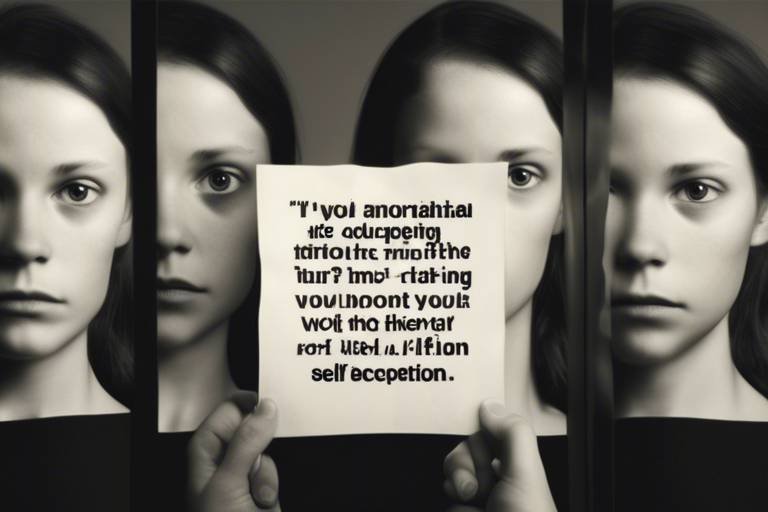Are Cheaters Ever Justified? – A Moral Examination
When we dive into the murky waters of infidelity, the question arises: are cheaters ever truly justified? It's a complex web of emotions, ethics, and individual circumstances that can make the answer anything but straightforward. In a world where relationships are often seen as sacred, the act of cheating can feel like a betrayal of trust and love. Yet, as we peel back the layers of this issue, we find that motivations can be as varied as the individuals involved. Some argue that external factors, such as emotional neglect or abusive dynamics, can push someone to seek solace in the arms of another. But does this make it right? In this exploration, we will navigate the intricate landscape of infidelity, examining the reasons behind cheating, the consequences it brings, and whether there are any scenarios that might warrant such actions.
Understanding what constitutes cheating is crucial. Infidelity isn't just a one-size-fits-all scenario; it encompasses a range of behaviors that can vary significantly between individuals and cultures. For some, cheating may mean a physical affair, while for others, it could be an emotional connection with someone outside their primary relationship. This variation in perception leads to a critical question: what defines cheating in your relationship? It's essential to have open discussions about boundaries and expectations to avoid misunderstandings. In many cultures, cheating is viewed as a severe breach of trust, while in others, it might be more accepted under certain circumstances. This cultural lens can heavily influence how individuals justify their actions, making it imperative to consider the broader context of infidelity.
Now, let's dig into the psychological factors that can drive someone to cheat. Often, it's not just a simple case of wanting something new or exciting; there are deeper issues at play. Individuals may cheat due to unmet needs, a desire for novelty, or even personal insecurities that stem from past experiences. The emotional landscape is complex, and understanding these motivations can shed light on why infidelity occurs. For instance, when partners feel disconnected, they may seek fulfillment outside their relationship, leading to a cycle of betrayal and hurt.
An emotional disconnect can be a significant catalyst for cheating. When partners experience a lack of intimacy and communication, the desire for connection can lead them to seek affection elsewhere. Imagine a plant that isn't receiving enough sunlight; it will stretch out in search of light, often reaching for the nearest source. Similarly, individuals in a relationship may stretch beyond their boundaries in search of emotional nourishment. This quest for connection can blur the lines of fidelity, making it crucial for partners to maintain open lines of communication and emotional engagement.
Past traumas can significantly influence an individual's propensity to cheat. Unresolved issues from previous relationships or childhood experiences can create patterns of behavior that manifest in adulthood. For example, someone who has experienced abandonment may struggle with trust and intimacy, leading them to seek validation through infidelity. This connection between personal history and relationship dynamics is vital to understanding the motivations behind cheating. It’s like carrying a backpack filled with rocks; the weight of past experiences can affect how we navigate new relationships.
Another compelling reason some individuals cheat is the desire for validation. In a world where social media often portrays an idealized version of life, some may feel inadequate or unworthy. Cheating can become a misguided attempt to boost self-esteem or gain approval from others. This need for external validation can lead to moral dilemmas, as individuals grapple with the consequences of their actions versus the fleeting satisfaction they seek. It's a dangerous game, often resulting in emotional turmoil for everyone involved.
Our society and cultural backgrounds play a significant role in shaping our views on cheating. Different cultures have varying perceptions of infidelity, with some being more lenient and others taking a hard stance against it. This can create a complex moral landscape where individuals justify their actions based on societal norms. For instance, in cultures where arranged marriages are common, the concept of love outside of marriage may be viewed differently, potentially leading to a higher acceptance of infidelity. Understanding these cultural nuances is essential for grasping the broader implications of cheating.
The repercussions of cheating extend far beyond the individuals involved. Infidelity can lead to emotional, psychological, and social consequences that ripple through relationships and communities. Trust issues often arise, making it challenging for partners to rebuild their connection. The fallout can be devastating, as the emotional scars left by cheating can linger long after the act itself. It's crucial to understand that cheating doesn't just affect the couple; it can also impact friends, family, and even children.
Cheating can have devastating effects on relationships. The dynamics between partners can shift dramatically, leading to potential breakdowns in trust and communication. Consider a bridge that has been compromised; even if it's repaired, the structural integrity can never be the same. Similarly, once trust is broken, it requires immense effort and commitment to rebuild. Many couples find themselves trapped in a cycle of blame and resentment, struggling to find their way back to a place of understanding and love.
The long-lasting emotional scars left by cheating can affect all parties involved. The psychological toll of infidelity can lead to anxiety, depression, and difficulties in future relationships. Individuals may carry the weight of betrayal into new partnerships, fearing that history will repeat itself. It's essential to acknowledge these emotional effects and seek healing, whether through therapy, open communication, or self-reflection. The journey to recovery can be arduous, but it's a necessary step toward personal well-being.
Some argue that certain circumstances may justify cheating. A common argument is that in cases of unhealthy relationships, infidelity may be viewed as a means of escape. For instance, individuals in abusive or toxic environments might feel compelled to seek affection elsewhere as a way to cope with their situation. This raises an important question: can cheating ever be a legitimate response to an unhealthy relationship? While some may find solace in this rationale, it’s essential to consider the potential consequences of such actions.
In cases of unhealthy relationships, cheating may be viewed as a desperate attempt to escape. Individuals may justify their actions as a way to reclaim their autonomy and seek happiness outside a toxic environment. However, this perspective can be misleading, as it often leads to further complications and emotional pain. It's vital for individuals in such situations to seek healthier ways to address their issues, whether through therapy, open dialogue, or finding support systems that encourage healing.
Open relationships challenge traditional views on fidelity. In consensual non-monogamy, partners agree to engage with others outside their primary relationship, blurring the lines of cheating. This arrangement can provide a framework for exploring desires without the guilt associated with infidelity. However, it requires clear communication, trust, and mutual consent to be successful. The question remains: does engaging in an open relationship justify infidelity, or does it simply redefine the concept of loyalty?
1. Is cheating ever justified?
While some circumstances may provide context for infidelity, it often leads to emotional pain and betrayal. It's essential to communicate openly with partners about needs and boundaries.
2. What are the psychological reasons behind cheating?
Factors such as unmet needs, emotional disconnect, and the desire for validation can drive individuals to cheat. Understanding these motivations can help address underlying issues in relationships.
3. How does cheating affect relationships?
Cheating can lead to trust issues, communication breakdowns, and long-lasting emotional scars. Couples may struggle to rebuild their connection after infidelity.
4. Can open relationships prevent cheating?
Open relationships can redefine loyalty and fidelity if both partners agree to the arrangement. Clear communication and mutual consent are crucial for success.

The Nature of Cheating
Understanding what constitutes cheating is crucial in navigating the murky waters of relationships. Cheating isn't just a one-size-fits-all scenario; it comes in various forms, each carrying its own weight of emotional baggage. When we think about infidelity, the first thing that often springs to mind is physical cheating—those moments of betrayal that involve a partner being intimate with someone else. However, cheating can also be emotional. This form of infidelity may not involve physical contact, but it can be just as damaging, if not more so, because it often undermines the very foundation of trust in a relationship.
To get a clearer picture, let's break down the different types of cheating:
- Physical Infidelity: Engaging in sexual activities with someone outside the primary relationship.
- Emotional Infidelity: Forming a deep emotional connection with someone else, sharing intimate thoughts and feelings.
- Online Cheating: Engaging in romantic or sexual conversations through social media or dating apps.
- Micro-cheating: Small acts that may not involve physical or emotional connections but indicate a lack of commitment, such as flirting or keeping secrets.
Perceptions of cheating can vary significantly among individuals and cultures. In some societies, emotional affairs might be viewed as less severe than physical ones, while in others, any form of betrayal is seen as unacceptable. This cultural lens shapes how people justify or condemn cheating. For instance, in cultures that emphasize collective values and family honor, infidelity can lead to severe social repercussions. Conversely, in more liberal societies, the emphasis might be on personal fulfillment, leading some to argue that individuals should pursue happiness, even if it means stepping outside their commitments.
Ultimately, the nature of cheating is complex and multifaceted. Each type of infidelity can evoke different responses and consequences, making it essential to consider the context and the individuals involved. So, can we ever truly define cheating universally? Or is it a personal and cultural construct that varies from one relationship to another? The answers may not be straightforward, but they certainly spark vital conversations about trust, commitment, and the very essence of love.

Psychological Motivations Behind Cheating
When we peel back the layers of infidelity, we often find a complex web of psychological motivations that drive individuals to cheat. It's not always about a simple lack of love or commitment; instead, it can stem from a variety of deeper emotional and psychological issues. Many people may wonder, "What could possibly drive someone to betray their partner?" The answers are as varied as the individuals themselves, but some common themes emerge.
One of the primary motivations for cheating is the feeling of unmet needs. In many relationships, partners may not fully understand or communicate their emotional or physical desires. When these needs go unfulfilled, individuals might seek satisfaction elsewhere. This doesn't only apply to physical needs; emotional needs play a huge role too. People crave intimacy, connection, and validation. When they feel these elements are lacking in their primary relationship, the temptation to find them outside can become overwhelming.
Another significant factor is the desire for novelty. Humans are naturally curious creatures, and sometimes the allure of something new can be too enticing to resist. This can manifest as a quest for excitement or adventure, particularly in long-term relationships where routine can dull the spark. Cheating can become a way to experience the thrill of the chase, leading individuals to justify their actions as a means of rekindling their excitement in life.
Moreover, personal insecurities often play a critical role in the decision to cheat. Individuals who struggle with self-esteem may cheat in an attempt to feel validated. They might believe that gaining attention from someone outside their relationship will boost their self-worth. This need for validation can create a vicious cycle, where the individual continues to seek external approval, further complicating their emotional landscape.
One of the most profound contributors to infidelity is an emotional disconnect between partners. When communication falters and intimacy dwindles, individuals may feel isolated and unloved. This disconnect can lead them to seek emotional support or affection from someone else, creating a dangerous path toward infidelity. It’s like trying to quench your thirst with a mirage; the temporary fulfillment can lead to deeper issues down the line.
Additionally, the impact of past trauma cannot be overlooked. Individuals with unresolved issues from previous relationships or childhood experiences may find it challenging to form healthy attachments. These past traumas can influence their behavior in current relationships, sometimes leading them to cheat as a way to cope with their feelings of inadequacy or fear of intimacy. It's crucial to understand that these patterns often repeat unless addressed, creating a cycle of hurt and betrayal.
Lastly, the desire for validation is a powerful motivator. Many people cheat in search of affirmation, attempting to fill a void in their self-image. This can stem from societal pressures or personal beliefs about worthiness. When someone feels they need external validation to feel good about themselves, they may turn to infidelity as a quick fix, not realizing the long-term consequences it may bring.
In conclusion, the psychological motivations behind cheating are multifaceted and deeply rooted in individual experiences and emotional needs. Understanding these motivations can shed light on the complexities of infidelity, helping partners navigate their relationships with greater awareness and empathy. After all, recognizing the underlying issues can be the first step toward healing and rebuilding trust.
- What are the main reasons people cheat? People cheat for various reasons, including unmet emotional or physical needs, desire for novelty, personal insecurities, and emotional disconnect in their relationship.
- Can past trauma influence cheating behavior? Yes, unresolved past traumas can affect how individuals form attachments and may lead to patterns of infidelity if not addressed.
- Is cheating always a sign of a failing relationship? Not necessarily. While cheating often indicates underlying issues, it can also stem from personal insecurities or desires that are not directly related to the relationship's health.
- How can couples rebuild trust after infidelity? Rebuilding trust requires open communication, understanding the motivations behind the cheating, and a commitment to healing and improving the relationship.

Emotional Disconnect
Emotional disconnect in a relationship is like a slow leak in a tire; it may not be immediately noticeable, but over time, it can lead to a complete blowout. When partners begin to feel distant, the intimacy that once bound them starts to fray. This lack of connection can create a void that some individuals attempt to fill by seeking affection and validation outside their primary relationship. But why does this happen? Often, it stems from a breakdown in communication and a failure to meet each other's emotional needs.
Imagine being in a relationship where you feel like you're speaking two different languages. One partner may be craving deep conversations and emotional support, while the other is more comfortable with surface-level interactions. This misalignment can lead to feelings of isolation and frustration. When emotional needs go unmet, it’s not uncommon for individuals to look elsewhere for fulfillment. They might find themselves in the arms of someone who listens, understands, or simply offers a fleeting escape from their emotional turmoil.
The consequences of such an emotional disconnect can be profound. It creates a cycle where one partner feels neglected, prompting them to seek attention outside the relationship, which in turn deepens the other partner's sense of abandonment. This vicious cycle can lead to a complete breakdown of trust and intimacy, leaving both individuals feeling hurt and betrayed.
Furthermore, the emotional disconnect can be exacerbated by external factors such as stress from work, family issues, or even personal insecurities. When life’s pressures pile up, it can be easy for partners to become engrossed in their own struggles, inadvertently pushing each other away. It’s essential to recognize these signs early on and address them before they spiral into infidelity.
In some cases, couples may benefit from counseling to help bridge the emotional gap. Therapy can offer a safe space for both partners to express their feelings and needs openly. By fostering better communication and understanding, couples can work towards rekindling their emotional connection, reducing the likelihood of seeking solace elsewhere.
In summary, emotional disconnect is a significant factor that can lead to infidelity. It’s crucial for couples to actively engage with one another, addressing their emotional needs and maintaining open lines of communication. By doing so, they can strengthen their bond and minimize the risk of straying from their commitments.
- What is emotional disconnect?
Emotional disconnect refers to a lack of emotional intimacy and connection between partners, often leading to feelings of isolation and neglect. - How can couples prevent emotional disconnect?
Regular communication, quality time together, and addressing each other's emotional needs can help prevent a disconnect. - Is infidelity always the result of emotional disconnect?
While emotional disconnect can be a significant factor, infidelity can also arise from various other motivations, including personal insecurities and societal influences.

Impact of Past Trauma
When we talk about the impact of past trauma on relationships, it's crucial to understand that unresolved issues can manifest in various ways, often leading individuals down a path of infidelity. Trauma can be like a shadow, lurking in the background of our lives, influencing our decisions and behaviors without us even realizing it. Imagine carrying a heavy backpack filled with rocks; each rock represents an emotional wound. Over time, this burden can become overwhelming, pushing individuals to seek relief in unhealthy ways, including cheating.
Many people who have experienced trauma may find it difficult to connect emotionally with their partners. This emotional disconnect can create a void that some attempt to fill through infidelity. For instance, someone who has faced abandonment in the past might struggle with intimacy in their current relationship, leading them to seek validation and affection outside of it. The irony is that, in trying to escape their pain, they often inflict more hurt on themselves and their partners.
Furthermore, the cycle of trauma can perpetuate itself. Individuals who cheat may have experienced betrayal in their previous relationships. This pattern can create a distorted view of love and trust, making it challenging to maintain healthy connections. To illustrate this point, consider the following table that outlines common types of trauma and their potential effects on relationships:
| Type of Trauma | Potential Impact on Relationships |
|---|---|
| Abandonment | Fear of intimacy, seeking validation outside the relationship |
| Abuse (emotional/physical) | Difficulty trusting partners, tendency to replicate unhealthy dynamics |
| Infidelity in past relationships | Increased suspicion, fear of betrayal, impulsive cheating behavior |
It's essential to recognize that while past trauma can influence behavior, it doesn't excuse infidelity. Understanding this connection can help individuals and couples navigate their challenges more effectively. The key lies in addressing the underlying issues, seeking help, and fostering open communication. Healing from past trauma requires vulnerability and a willingness to confront uncomfortable truths, but the rewards can lead to stronger, healthier relationships.
In conclusion, the impact of past trauma on cheating is profound and multifaceted. By acknowledging these influences, individuals can take steps towards healing and rebuilding trust within their relationships. It’s a journey worth embarking on, as it not only benefits personal growth but also enhances the quality of connections with others.
- Can past trauma be resolved? Yes, with the right support and therapeutic approaches, individuals can process and heal from their trauma.
- Is cheating always a sign of deeper issues? While not always, infidelity often indicates unresolved emotional conflicts or unmet needs.
- How can couples rebuild trust after infidelity? Open communication, therapy, and a commitment to understanding each other's feelings are essential steps.

Desire for Validation
The is a powerful motivator that can lead individuals down the slippery slope of infidelity. Many people seek approval and affirmation from others to boost their self-esteem. In relationships, when partners fail to provide this necessary validation, one might feel compelled to seek it outside the relationship. Think of it like a plant that needs sunlight; without it, the plant wilts. Similarly, when individuals feel neglected or unappreciated, they may look for nourishment in the form of external attention.
This quest for validation can manifest in various ways. For instance, some individuals might engage in flirtatious behavior or seek out emotional connections with others as a means to feel desired and valued. This behavior is often rooted in deeper insecurities and unmet emotional needs. When someone feels invisible or undervalued in their primary relationship, they may start to question their worth. This internal struggle can lead to a search for affirmation elsewhere, creating a moral dilemma where the line between right and wrong becomes blurred.
Moreover, the impact of social media cannot be overlooked in this context. In today’s digital age, the constant exposure to curated lives and relationships can exacerbate feelings of inadequacy. When individuals scroll through their feeds and see others receiving love and attention, it can trigger feelings of jealousy and longing. This can lead to a desperate need to feel validated, often resulting in infidelity as a misguided attempt to reclaim a sense of self-worth.
It's essential to recognize that the quest for validation can be both conscious and subconscious. While some may knowingly seek out validation through cheating, others might not even realize that their actions stem from a deeper need for acceptance. This psychological complexity makes it challenging to label infidelity as purely right or wrong. In many cases, the underlying issues that prompt someone to cheat are rooted in their personal history, emotional health, and relational dynamics.
Ultimately, the desire for validation raises significant questions about the health of a relationship. If one partner feels the need to seek validation outside the relationship, it often signals deeper issues that need to be addressed. Open communication and emotional support are crucial in mitigating this desire for external affirmation. By fostering a nurturing environment where both partners feel valued and appreciated, couples can reduce the likelihood of infidelity driven by the need for validation.
- What are the common reasons people cheat? - Cheating can stem from various factors including emotional disconnect, desire for novelty, or seeking validation.
- Can cheating ever be justified? - While some argue that certain circumstances may justify infidelity, it often leads to more complex emotional consequences.
- How can couples rebuild trust after infidelity? - Open communication, therapy, and rebuilding emotional intimacy can help couples recover from the impact of cheating.
- Is it possible to have a healthy open relationship? - Yes, open relationships can be healthy if both partners communicate openly and set clear boundaries.

Societal and Cultural Influences
When we dive into the complex world of cheating, we can't ignore the profound impact that have on our perceptions and behaviors surrounding infidelity. Different cultures view cheating through varying lenses, often shaped by historical, religious, and social norms. For instance, in some societies, infidelity might be seen as a grave moral failing, while in others, it could be brushed off as a mere consequence of human nature. This disparity raises an intriguing question: can the cultural context in which we live truly justify infidelity?
In many Western cultures, monogamy is often regarded as the gold standard of romantic relationships. This belief is deeply rooted in societal values that emphasize commitment and loyalty. However, in other cultures, such as certain indigenous tribes or communities with different religious beliefs, polygamy or open relationships may be accepted or even encouraged. This divergence can create a significant gap in how individuals interpret their actions when it comes to cheating.
Moreover, societal expectations can pressure individuals into cheating. Imagine someone trapped in a relationship that no longer fulfills their emotional or physical needs. Instead of openly discussing these feelings, societal norms may compel them to seek validation outside their relationship. This need for external validation can be exacerbated by social media, where curated images of perfect relationships can create unrealistic expectations. As a result, some may feel justified in their infidelity, believing they are merely responding to a lack of satisfaction in their current relationship.
To illustrate this point, consider the following table, which outlines various cultural attitudes towards infidelity:
| Culture | View on Cheating |
|---|---|
| Western Cultures | Generally viewed as a betrayal of trust and commitment. |
| Some African Cultures | Polygamy is accepted; infidelity may not carry the same stigma. |
| Middle Eastern Cultures | Often considered a serious offense, but some may practice polygamy. |
| Indigenous Tribes | May have varied views; some accept non-monogamous relationships. |
Ultimately, the interplay between societal norms and personal beliefs creates a complex web that influences individual decisions regarding cheating. As we navigate these cultural waters, it’s essential to recognize that what might be justifiable in one context could be deemed unacceptable in another. This understanding can help foster more empathetic conversations about infidelity, encouraging individuals to reflect on their circumstances rather than hastily judging others.
- What are the most common reasons people cheat?
Common reasons include emotional disconnect, desire for novelty, and unmet needs in the primary relationship.
- Can cheating ever be justified?
Some argue that circumstances like abusive relationships or lack of compatibility can justify infidelity, though this remains a contentious topic.
- How do societal norms affect perceptions of cheating?
Societal norms shape individual beliefs about fidelity, influencing how cheating is viewed and whether it is deemed acceptable or not.

Consequences of Cheating
Cheating is not just a fleeting moment of betrayal; it casts a long shadow over the lives of everyone involved. The consequences of infidelity ripple through relationships, families, and social circles, often leaving emotional and psychological scars that can take years to heal. When trust is broken, it can feel like a bomb has gone off in the fabric of a relationship, tearing apart the bonds that once held partners together. It's essential to understand that the repercussions of cheating extend far beyond the immediate parties, affecting friends, family, and even children.
One of the most significant consequences of cheating is the emotional turmoil it creates. For the betrayed partner, feelings of anger, sadness, and betrayal can be overwhelming. The sense of loss isn't just about the relationship; it's also about the shattered dreams and expectations for the future. Trust, once broken, is incredibly hard to rebuild. It’s like trying to piece together a shattered vase; no matter how well you fix it, it will never be the same again. This emotional fallout can lead to serious mental health issues, such as depression and anxiety, affecting day-to-day life and overall well-being.
Moreover, the psychological impact of infidelity can lead to a variety of consequences. Individuals who cheat may experience guilt and shame, which can manifest in various ways. They might become defensive or withdrawn, creating a cycle of secrecy and mistrust that further complicates the situation. On the other hand, the partner who has been cheated on may struggle with self-esteem issues, questioning their worth and desirability. This can lead to a cycle of negative self-talk, making it difficult for them to engage in future relationships with confidence.
Socially, the fallout from cheating can be equally damaging. Relationships with friends and family can become strained as sides are taken, leading to a rift in social circles. Friends may feel compelled to choose between the couple, resulting in awkward situations and a sense of isolation for both parties. Furthermore, if children are involved, the consequences can be even more profound. Children may feel caught in the middle, experiencing confusion and emotional distress as they navigate their parents' tumultuous relationship.
To illustrate the multifaceted consequences of cheating, consider the following table that outlines the emotional, psychological, and social impacts:
| Type of Consequence | Examples |
|---|---|
| Emotional | Anger, sadness, feelings of betrayal, loss of trust |
| Psychological | Depression, anxiety, low self-esteem, guilt |
| Social | Strained friendships, family discord, children's emotional distress |
In summary, the consequences of cheating are profound and far-reaching, affecting not just the individuals directly involved but also their wider social networks. The emotional scars can linger long after the initial betrayal, making it crucial for those affected to seek support and healing. Understanding these consequences can help individuals navigate the complex aftermath of infidelity, whether they are the ones who cheated or the ones who were cheated on. Ultimately, recognizing the depth of these impacts can foster empathy and a deeper understanding of the moral implications surrounding cheating.
- Can a relationship survive after cheating? Yes, many relationships can survive infidelity if both partners are willing to work through the issues, communicate openly, and seek professional help if needed.
- What are the signs that someone might cheat? Signs can include emotional distance, changes in behavior, secrecy, and a sudden interest in their appearance. However, these signs do not guarantee infidelity.
- Is cheating always a sign of a failing relationship? Not necessarily. While many people cheat due to issues in their relationship, some may cheat for personal reasons unrelated to their partner.
- How can trust be rebuilt after cheating? Rebuilding trust takes time, honesty, and consistent effort from both partners. Open communication and transparency are key elements in this process.

Impact on Relationships
Cheating can have devastating effects on relationships, often leaving emotional wreckage in its wake. When one partner strays, it’s not just a breach of trust; it’s like throwing a grenade into the very foundation of the relationship. The immediate aftermath can feel like a whirlwind of confusion, anger, and betrayal. Trust, once shattered, can be incredibly difficult to rebuild. You might wonder, can a relationship truly recover from such a betrayal? The answer is complex and depends heavily on the individuals involved and their willingness to address the underlying issues.
When infidelity occurs, the dynamics between partners shift dramatically. Communication often breaks down, as the betrayed partner grapples with feelings of inadequacy and hurt. They may start to question their self-worth, asking, “What did I do wrong?” This internal dialogue can lead to a vicious cycle of blame and resentment. On the other hand, the cheating partner may experience guilt and shame, which can manifest in defensive behavior. The emotional distance that emerges can create a chasm so wide that it feels insurmountable.
Moreover, the impact of cheating extends beyond just the two individuals involved. It can ripple through families and social circles, affecting friendships and even relationships with children. Imagine a family gathering where the tension is palpable, and everyone is aware of the unspoken betrayal. The emotional fallout can lead to a loss of mutual friends, as people often feel compelled to take sides. This social isolation can intensify feelings of loneliness and despair for both partners.
To illustrate the profound effects of cheating on relationships, consider the following table:
| Impact Area | Effects of Cheating |
|---|---|
| Trust | Severe erosion of trust, making future honesty difficult. |
| Communication | Breakdown in open dialogue, leading to misunderstandings. |
| Emotional Health | Increased anxiety, depression, and feelings of inadequacy. |
| Social Relationships | Strain on friendships and family dynamics, potential isolation. |
In many cases, couples may choose to seek therapy to navigate the tumultuous waters post-infidelity. Therapy can provide a safe space for both partners to express their feelings and work through the pain. It’s a chance to explore whether the relationship can be salvaged or if it’s time to part ways. Some couples even emerge stronger, equipped with better communication skills and a deeper understanding of each other’s needs. However, this is not guaranteed; many relationships do not survive the storm of infidelity.
Ultimately, the impact of cheating on relationships is profound and multifaceted. It forces both partners to confront their vulnerabilities and the very essence of their connection. While some relationships can heal and grow from this experience, others may find themselves irrevocably changed, leading to separation or divorce. It’s a painful reality, but one that many couples face in the wake of betrayal.
- Can relationships survive infidelity? Yes, some relationships can survive infidelity if both partners are willing to work through the issues and rebuild trust.
- What are the signs of an unhealthy relationship? Signs include constant conflict, lack of communication, and emotional or physical abuse.
- Is therapy helpful after cheating? Therapy can be very beneficial as it provides a structured environment to address feelings and improve communication.
- How can trust be rebuilt after cheating? Rebuilding trust takes time, transparency, and consistent effort from both partners.

Long-term Emotional Effects
Cheating is not just a fleeting act; it leaves a permanent mark on everyone involved. The emotional fallout can be profound and long-lasting, affecting not just the individuals directly involved in the affair but also their families and future relationships. Imagine a shattered mirror—each piece represents a fragment of trust broken, and no matter how much you try to piece it back together, the cracks remain visible.
For the betrayed partner, the emotional toll can be devastating. Feelings of betrayal, anger, and confusion often swirl together, creating a chaotic emotional landscape. Many individuals experience a significant decline in their self-esteem, questioning their worth and desirability. This self-doubt can lead to a cycle of anxiety and depression, making it difficult to move forward. It's like being stuck in a fog where clarity is hard to find, and every step feels uncertain.
On the other hand, the individual who cheated may also face their own set of emotional repercussions. Guilt and shame can become overwhelming, leading to feelings of isolation. They might grapple with the question of why they cheated in the first place, and this introspection can be painful. The emotional burden of having hurt someone they cared about can lead to a constant state of internal conflict. It's akin to carrying a heavy backpack filled with rocks; eventually, the weight becomes unbearable.
Interestingly, the long-term effects of cheating can also manifest in future relationships. Trust issues often arise, as the betrayed partner may find it challenging to fully open up to new partners. They might constantly worry about being cheated on again, leading to jealousy and paranoia. This can create a vicious cycle, where the fear of betrayal leads to behaviors that push partners away, ultimately fulfilling the very fears they are trying to avoid.
To illustrate the emotional journey post-infidelity, consider the following table that summarizes the common long-term emotional effects:
| Emotional Effect | Description |
|---|---|
| Betrayal | Feelings of deep hurt and disappointment in a partner. |
| Trust Issues | Difficulty in trusting future partners, leading to anxiety. |
| Low Self-Esteem | Questioning one’s worth and desirability after being cheated on. |
| Guilt and Shame | Feelings experienced by the cheater, often leading to isolation. |
In summary, the emotional effects of cheating can linger long after the act itself. Both the betrayed and the betrayer face a complex web of feelings that can shape their future relationships and overall mental health. It's a reminder that the consequences of our actions often extend far beyond the immediate moment, echoing through our lives in ways we might not fully understand.
- Can cheating ever be justified? While some may argue that circumstances can warrant infidelity, most experts agree that communication and addressing relationship issues are healthier solutions.
- What are common signs of emotional cheating? Emotional cheating can manifest as a deep emotional connection with someone outside the relationship, often involving secretive communication and a lack of intimacy with the partner.
- How can couples rebuild trust after infidelity? Rebuilding trust requires open communication, understanding, and often professional help. Both partners must be willing to work through their feelings and rebuild their relationship from the ground up.

Justifications for Cheating
When it comes to the complex world of relationships, the question of whether cheating can ever be justified is a hotly debated topic. Some individuals argue that in certain circumstances, infidelity may be a reasonable response to unmet needs or toxic environments. This perspective often stems from a deeply personal understanding of what individuals experience in their relationships. For instance, consider someone who feels trapped in a relationship where their emotional and physical needs are consistently ignored. In such cases, cheating might be perceived not as a betrayal, but as an act of self-preservation.
One of the most common justifications for cheating revolves around the notion of unhealthy relationships. When partners find themselves in a toxic dynamic—marked by emotional abuse, manipulation, or neglect—they may feel that their only escape is to seek affection and validation elsewhere. This is not to say that cheating is the ideal solution, but rather that it can be seen as a desperate measure for individuals who feel desperate and alone. The emotional toll of staying in a harmful relationship can push someone to seek solace outside, leading them to justify their actions as a means of survival.
Another scenario that often arises in discussions about cheating justifications is the concept of compatibility issues. Imagine a couple where one partner has evolved in their desires, interests, or even sexual preferences, while the other remains stagnant. In such situations, one partner might feel that their needs are not being met within the relationship. They may argue that exploring their desires outside the relationship is a way to find fulfillment that their current partner cannot provide. While this might seem like a rationalization for infidelity, it also raises questions about the integrity of the relationship itself and whether both partners are truly committed to making it work.
Additionally, the rise of open relationships has introduced a new layer to the conversation about infidelity. In consensual non-monogamous arrangements, partners agree to explore romantic or sexual relationships outside their primary bond. This blurs the lines of what constitutes cheating and challenges the traditional views on fidelity. For some, this arrangement can provide a sense of freedom and fulfillment that a monogamous relationship may not offer. However, it also requires a high level of communication and trust, as miscommunication can easily lead to feelings of betrayal.
Ultimately, while some individuals may find ways to justify their actions, it’s important to remember that cheating often leads to complex emotional consequences for all parties involved. The question remains: can any justification truly make infidelity acceptable? As we delve deeper into the moral implications of cheating, it’s crucial to consider the emotional landscape that surrounds these choices, as well as the potential for growth and understanding that can emerge from such difficult situations.
- Is cheating ever justifiable? - While some argue that certain circumstances may warrant infidelity, it's essential to consider the emotional consequences for everyone involved.
- What are common reasons people cheat? - Common reasons include unmet emotional needs, desire for novelty, and feelings of disconnection in the relationship.
- Can open relationships prevent cheating? - Open relationships can provide a framework for exploring outside connections, but they require strong communication and mutual consent to be successful.
- How can one recover from infidelity? - Recovery from infidelity often involves open communication, counseling, and a willingness to rebuild trust.

Unhealthy Relationships
When we dive into the murky waters of , it's essential to recognize that the emotional landscape can be as tumultuous as a stormy sea. Often, individuals find themselves in relationships that are not just unfulfilling but actively damaging. In these scenarios, cheating may emerge as a complex response to a toxic environment. The question arises: can infidelity be justified if it serves as a means of escape from emotional or physical harm?
In many cases, individuals trapped in unhealthy relationships experience a profound sense of isolation and despair. They may feel as though they are navigating a labyrinth with no exit, leading to a yearning for connection and validation elsewhere. For some, the act of cheating becomes a desperate attempt to reclaim a sense of agency and self-worth that has been eroded by their partner's behavior. This is not to say that cheating is a healthy solution, but rather that it can be viewed through a lens of survival in dire circumstances.
Consider the following factors that often characterize unhealthy relationships, which can lead to infidelity:
- Emotional Abuse: Constant criticism, manipulation, and gaslighting can leave individuals feeling worthless and seeking affirmation from others.
- Lack of Communication: When partners stop communicating effectively, misunderstandings and resentment can fester, pushing one partner to seek solace outside the relationship.
- Physical Abuse: In extreme cases, individuals may cheat as a way to escape a physically abusive situation, viewing infidelity as a means of survival.
It's important to note that while cheating may seem like a justified response in these situations, it often leads to further complications. The emotional fallout from infidelity can exacerbate existing issues, creating a cycle of pain for everyone involved. Relationships characterized by abuse or neglect require healing and resolution, ideally through open communication or professional help, rather than through betrayal.
Moreover, the societal stigma surrounding cheating can add another layer of complexity. Many people are quick to judge without understanding the full context of the relationship dynamics at play. This judgment can further isolate individuals who are already suffering, making it even harder for them to seek help or support. In a world where we often prioritize loyalty above all else, it’s crucial to consider the nuances of each situation.
In conclusion, while some may argue that cheating in an unhealthy relationship can be justified, it’s vital to approach this topic with caution. Instead of resorting to infidelity, seeking help, fostering communication, and addressing underlying issues can lead to healthier outcomes. After all, navigating the rocky terrain of relationships is challenging enough without adding the complications of betrayal into the mix.
- Can cheating ever be justified? - While some argue that certain circumstances may warrant infidelity, it is often more beneficial to address relationship issues directly.
- What are the signs of an unhealthy relationship? - Indicators include emotional or physical abuse, lack of communication, and feelings of isolation.
- How can couples work through infidelity? - Open communication, counseling, and a commitment to rebuilding trust are essential steps.
- Is it possible to recover from cheating? - Yes, recovery is possible, but it requires effort from both partners to heal and rebuild the relationship.

Exploring Open Relationships
In a world where traditional notions of fidelity are being challenged, open relationships have emerged as a fascinating alternative to monogamy. But what exactly does it mean to be in an open relationship? Essentially, it's a consensual arrangement where partners agree that they can engage in romantic or sexual relationships with other people outside their primary partnership. This concept can be both liberating and confusing, as it requires a level of communication and trust that isn't always easy to achieve.
One of the most compelling aspects of open relationships is the way they can reshape the dynamics of intimacy. Instead of viewing infidelity as a betrayal, partners in open relationships often see it as a way to explore their desires and fulfill unmet needs without jeopardizing the foundational bond they share. This approach can lead to a deeper understanding of each other's wants and boundaries, ultimately strengthening the primary relationship. However, it also raises important questions about jealousy, emotional safety, and the potential for heartache.
To navigate the complexities of open relationships, clear communication is essential. Partners must openly discuss their feelings, set boundaries, and regularly check in with one another to ensure that both parties feel secure. Here are some key considerations:
- Establishing Boundaries: What are the rules? Are there specific people that are off-limits? These questions must be addressed upfront.
- Emotional Check-ins: Regularly discussing feelings can help partners address any jealousy or insecurity that may arise.
- Health and Safety: Open relationships require a commitment to safe sex practices to protect all parties involved.
Despite the potential benefits, open relationships are not for everyone. Some individuals may find it challenging to cope with feelings of jealousy or insecurity, which can lead to conflict. Additionally, societal norms often stigmatize non-traditional relationship structures, making it difficult for those in open relationships to find acceptance and support. Understanding these challenges is crucial for anyone considering this lifestyle.
Ultimately, exploring open relationships invites us to rethink what love and commitment mean. By embracing the idea that love can be expansive rather than restrictive, individuals may find new ways to connect and grow, both within themselves and with their partners. However, it's essential to approach this journey with caution, self-awareness, and a willingness to communicate openly. After all, the heart can be a complex landscape, and navigating it requires both skill and sensitivity.
- What is an open relationship? An open relationship is a consensual arrangement where partners agree to engage in romantic or sexual relationships with other people outside their primary partnership.
- How do I know if an open relationship is right for me? Consider your feelings about jealousy, communication skills, and whether you and your partner can establish clear boundaries and trust.
- Can open relationships work long-term? Yes, many couples find that open relationships can enhance their connection, but it requires ongoing communication and mutual respect.
- What are the risks of being in an open relationship? Risks include potential jealousy, emotional pain, and the challenges of navigating societal stigma.
Frequently Asked Questions
- What is considered cheating in a relationship?
Cheating can take many forms, including physical infidelity, emotional affairs, and even online relationships. It often involves breaking the trust and boundaries set within a partnership. Different cultures and individuals may have varying definitions of what constitutes cheating, making it a complex issue.
- What are the psychological reasons behind infidelity?
People cheat for a variety of psychological reasons. Common motivations include unmet emotional needs, a desire for novelty, and personal insecurities. Sometimes, individuals may seek validation outside their primary relationship to boost their self-esteem or escape from feelings of inadequacy.
- Can a lack of communication lead to cheating?
Absolutely! A significant emotional disconnect often stems from poor communication. When partners fail to connect on an intimate level, one or both may seek fulfillment elsewhere, believing that their needs are not being met within the relationship.
- How does past trauma influence infidelity?
Unresolved past traumas can significantly impact an individual’s behavior in relationships, including the propensity to cheat. These experiences may create patterns of distrust or emotional unavailability, leading to infidelity as a misguided attempt to cope or find solace.
- Are there cultural differences in how cheating is viewed?
Yes, cultural norms and societal expectations greatly influence perceptions of infidelity. In some cultures, cheating might be more accepted or even expected under certain circumstances, while in others, it could be seen as a severe breach of trust with significant consequences.
- What are the consequences of cheating?
The fallout from cheating can be extensive, affecting not just the individuals involved but also their families and friends. Emotional scars, trust issues, and relationship breakdowns are common consequences that can lead to long-term psychological effects on all parties involved.
- Can cheating ever be justified?
Some argue that certain situations, such as being in an unhealthy or abusive relationship, might justify cheating as a means of escape. However, this perspective is highly debated and often leads to complex moral dilemmas regarding fidelity and personal integrity.
- What is the role of open relationships in the discussion of cheating?
Open relationships challenge traditional views on fidelity by allowing consensual non-monogamy. In such arrangements, partners agree to engage with others outside their primary relationship, which can blur the lines of cheating and raise questions about what constitutes infidelity.



















